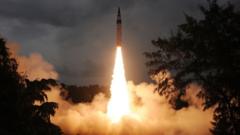The recent stand-off between India and Pakistan highlights the ever-present risk of nuclear war between the two nations, despite their historical restraint. Both countries maintain substantial nuclear arsenals and engage in strategic posturing, raising concerns that miscalculations or accidents could lead to devastating consequences.
The Persistent Threat of Nuclear Conflict: India and Pakistan's Fragile Stability

The Persistent Threat of Nuclear Conflict: India and Pakistan's Fragile Stability
Amidst escalating tensions, the fear of nuclear war between India and Pakistan looms large, requiring careful navigation by both nations to avert catastrophe.
The current tensions between India and Pakistan spark renewed fears of a potential nuclear conflict, underscoring the precarious nature of their bilateral relations. While recent standoffs have not culminated in overt threats, they have illustrated how easily the situation can escalate.
An alarming 2019 study outlined a dire future in which a terrorist attack on India's parliament could trigger a nuclear exchange with Pakistan. This prediction feels eerily relevant as both countries, holding approximately 170 nuclear weapons each, continue to engage in military posturing and veiled threats. The latest crisis, while temporarily diffused by US intervention, reignited concerns about the fragility of peace in a region long overshadowed by the specter of nuclear war.
In statements framed as defiance against "nuclear blackmail," Indian Prime Minister Narendra Modi reaffirmed India's commitment to its no-first-use policy, although this stance has faced challenges over the years. Meanwhile, Pakistan's ambiguous nuclear doctrine hints at a willingness to use its arsenal under extreme circumstances, with assertions from past leaders indicating a readiness to retaliate decisively.
Despite both countries developing more sophisticated nuclear capabilities and delivery systems, analysts suggest that the immediate risk of nuclear escalation remains low. As security expert Christopher Clary pointed out, a lack of large-scale ground combat minimizes the pressures that often lead to nuclear usage. Yet, the potential for accidents or miscalculations, as evidenced by a past incident where India accidentally fired a nuclear-capable missile into Pakistani territory, poses ongoing risks.
Reflecting on historical precedents, such as the Kargil War, experts argue that while nuclear weapons act as a deterrent, they also introduce a lingering danger to both nations. As long as India and Pakistan continue to enhance their arsenals, the possibility of a catastrophic misstep remains, despite their leaders’ past ability to navigate crises without escalation.
Ultimately, while the threat of nuclear war between India and Pakistan might seem distant, even a low probability carries unacceptable stakes. The international community watches closely, hopeful that both nations can maintain a fragile peace amidst growing regional complexities.





















